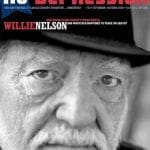Hello Stranger from Issue #53
We are well aware that few of you come to these pages seeking a dialogue on politics, that we are one of the rare publications fortunate enough to have an audience which holds passionately to diverse views.
Even in this, as near to an election special issue as this magazine is ever likely to come, we honor and respect those divergent opinions.
But we live in an extraordinary time — an extraordinarily dangerous time — and the future of the United States seems very much to turn on this single vote.
So, once again, we ask your indulgence.
Running through much of this issue is a dialogue about the state of our union. In almost all cases, the subject came up because the artists profiled have made an effort to express their feelings and concerns in the music they’re making right now. This is as it should be: There is a long history in America of intertwined relationships between art and politics, because what happens in the political world clearly impacts the environment within which art is made.
Thus, it was no surprise when Mavis Staples and her family took up the cause of Martin Luther King’s civil rights movement in the music they made during their late-’60s and early-’70s heyday. Nor was it any more surprising last winter when Willie Nelson wrote a song called “Whatever Happened To Peace On Earth” and asked, “How much is that soldier’s life worth?” (That both Staples and Nelson participated in the program of the final night of the Democratic Convention on July 29 seemed a fitting coincidence.)
Like many Americans, Jason Ringenberg was motivated by a concerned for the future of his family and his country when he confessed, in the song “American Reprieve” from his new album, “It’s all there all over me, the fear and insecurity…Now Vietnam is history, and brother that lesson didn’t come for free.”
Fundamental liberties such as freedom of speech are of great import to artists as well, a matter that seems underscored by Camper Van Beethoven leader David Lowery’s willingness to approve usage of one of his songs in the conservative film Michael Moore Hates America. Regardless of whether he agrees with the movie’s message, he understands the filmmaker’s right to express it — just as Lowery was well within his rights on the night of March 15, 2003, when he declared from the stage of La Zona Rosa in Austin, Texas, a couple days after the Dixie Chicks fiasco, that he was also a native of Texas and he was equally ashamed of our president.
Lest anyone be concerned that we wish not to hear all sides ourselves, consider the words of bluegrass great Paul Williams, who sings on his recent album, Living On The Hallelujah Side: “Cowards and traitors and all God-haters, one day before God they’ll stand.”
The connection between the political and the spiritual is not lost on Buddy Miller, though his worries about the waging of war have led him to a different place than Williams. On his new album, he underscores America’s tradition of speaking out in song by covering Bob Dylan’s 40-year-old classic “With God On Our Side”. It still resonates today — perhaps even more than ever, in fact.
So. This November we are offered the rare chance to choose between two quite distinct futures. Once made, our decision may well set the course of these United States for decades to come.
In this time of war we have the opportunity to choose between two men whose experience of combat could not be more different, whose visions of our future could not be more divergent. It seems most likely that this election will be decided by events in Iraq (and within the U.S. economy) that are well beyond the control of either candidate. We can only hope that it will not be decided by the endlessly divisive culture wars, which serve principally as fund-raising tools for both sides.
So we take to this page not simply to reinforce the antipathy of pointy headed liberals to the present administration. We take to this page because George W. Bush has failed in his fundamental responsibility as president of these United States. As our leader.
On September 12, 2001, this country stood more united than it has at any time since World War II. On September 12, 2001, this country had more support from the international community than at any time since World War II. That unity and support have been senselessly, heedlessly squandered. (We offer Ed Ward’s essay in this issue to explore some of the overarching matters at stake in this regard.)
By now you’re no doubt plenty familiar with the details — the intelligence failures about weapons of mass destruction, the lack of evidence connecting Saddam Hussein to Al-Quaeda, the Bush administration’s failure to plan for the peace in Iraq after winning the war. At the root of it all is the administration’s decision to wage a pre-emptive war, a definitive shift in this nation’s long-standing diplomatic tradition.
Further, the Bush administration argues that the fight against terror — as carried out through the Patriot Act in the United States, at the Guantanamo Bay prison camp in Cuba, and at Abu Ghraib in Iraq — invalidates the cardinal freedoms expressed in the Bill of Rights and the fundamental principals upon which this country is built.
Had any corporate executive gambled his shareholders’ fortunes on such a great risk, and on the basis of such demonstrably flawed information, he would be removed from office. This president deserves no less.
And we deserve better. This is why we endorse the candidacy of John Kerry and John Edwards.
Decisions, as one of the scriptwriters for “The West Wing” wrote, are made by those who show up. Whether or not you agree with us, please register and vote come election day.




